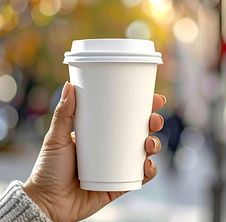_edited.jpg)
Disposable Cups: The Problem with Styrofoam and Plastic Linings
Styrofoam Cups (Polystyrene): Made from petroleum-based plastic that can leach toxic chemicals when exposed to heat or acid. The main concern, styrene, is a probable human carcinogen.
Plastic-Lined Paper Cups: Most paper cups are lined with polyethylene plastic (PE) to prevent leaks. When heated, these linings can release microplastics and chemical residues — sometimes including PFAS “forever chemicals.”
Affiliate links at no extra cost to you.
The Best Non-Toxic, Compostable Cups
SHOP ON AMAZON
What about disposable plates?
Even without hot liquids, disposable plates can leach chemicals — especially with greasy or acidic foods.
-
Styrofoam: Can release styrene, a possible carcinogen, and breaks into microplastics.
-
Plastic: May release plasticizers and hormone-disrupting additives when heated.
-
Paper: Often coated with plastic or PFAS that can leach into food.
Disposable Plates - Bamboo, Palm Leaf & Sugar Cane
SHOP ON AMAZON
Cutlery
Plastic cutlery may be convenient, but it poses a serious threat to the environment. Most disposable forks, knives, and spoons are made from petroleum-based plastics like polystyrene or polypropylene, which are not biodegradable. These utensils often end up in landfills, waterways, or oceans, where they can persist for hundreds of years, breaking down into harmful microplastics.
The Problem with Regular Plastic Cups (Like SOLO)
Traditional plastic cups, such as those made by SOLO, are usually made from polystyrene or polypropylene—both petroleum-based plastics. They typically end up in landfills where they persist for hundreds of years.
SHOP ON AMAZON

However, they’re only compostable in industrial facilities—not in home compost or landfills. Still, they’re a better choice than traditional plastic or Styrofoam when properly disposed of.
Earth Friendly Picnic
For an earth-friendly picnic or event, choosing plastic-free, compostable tablecloths and trash bags is a simple swap that makes a big impact. Unlike conventional options, which often contain petroleum-based plastics and leave behind microplastic waste, these sustainable alternatives are made from plant-based materials that break down naturally—not in centuries.






_edited.jpg)




_edited.jpg)
_edited.jpg)
_edited.jpg)

_edited.jpg)
_edited.jpg)
